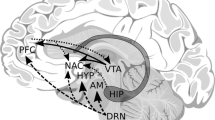Abstract.
Rationale: Chronic administration of nicotine in rats results in upregulation of neuronal nicotinic receptors. Upregulation has been proposed to reflect receptor desensitization, which may underlie functional tolerance to nicotine's effects. However, evidence indicates that tolerance and upregulation do not always parallel each other, suggesting that either upregulation does not always reflect desensitization, or mechanisms other than receptor desensitization account for tolerance to nicotine. Objectives: The present studies examined tolerance to nicotine-induced antinociception and changes in receptor binding after two regimens of intermittent nicotine injections in rats. The role of receptor activation in upregulation and tolerance was also examined by co-administering nicotine with the non-competitive antagonist, mecamylamine. Methods: Sprague-Dawley rats were administered a short (once-daily, SC for 6 days (0.35 mg/kg)) or long (twice-daily for 11 days (0.66 mg/kg)) series of injections and tolerance to nicotine-induced antinociception and [3H]epibatidine binding in whole brain were measured. Results: The short series of injections resulted in tolerance to nicotine-induced antinociception, but failed to increase [3H]epibatidine binding. In contrast, the long series of injections resulted in both tolerance and increased receptor binding. Once-daily pairings of mecamylamine (1 mg/kg, SC) with nicotine (0.35 mg/kg) for 6 days blocked the development of tolerance, indicating receptor activation is necessary for tolerance to occur. Pairing mecamylamine with nicotine (0.66 mg/kg) twice daily for 11 days blocked tolerance but produced a greater increase in [3H]epibatidine binding than nicotine alone. Conclusions: A dissociation of tolerance from receptor upregulation was observed in the present study. The finding that receptor activation may be necessary for tolerance but not upregulation is discussed within the context of possible mechanisms controlling tolerance to nicotine.
Similar content being viewed by others
Author information
Authors and Affiliations
Additional information
Electronic Publication
Rights and permissions
About this article
Cite this article
McCallum, S. ., Caggiula, A. ., Booth, S. et al. Mecamylamine prevents tolerance but enhances whole brain [3H]epibatidine binding in response to repeated nicotine administration in rats. Psychopharmacology 150, 1–8 (2000). https://doi.org/10.1007/s002130000401
Received:
Accepted:
Issue Date:
DOI: https://doi.org/10.1007/s002130000401




